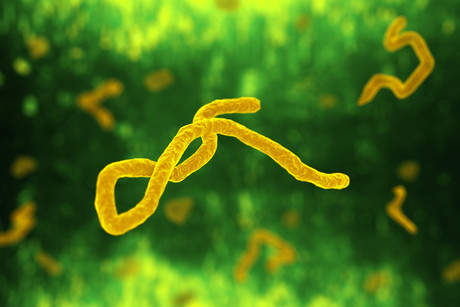Ebola virus allegedly re-emerges in survivor, infects family

Ebola virus may have re-emerged in a woman a year after she survived an acute infection, potentially leading to the infection of her husband and two of their sons.
That’s according to an outbreak report of the last known cluster of infections from a source within Liberia (occurring in November 2015), published in The Lancet Infectious Diseases.
From 2014 to 2015, the Ebola virus disease outbreak in West Africa resulted in more than 28,000 cases and 11,000 deaths across Liberia, Guinea and Sierra Leone. The first case in Liberia was reported in March 2014 and spread rapidly across the country, killing more than 4800 people. In May 2015, Liberia was declared free of human-to-human Ebola virus transmission.
In June 2015, a month after Liberia had been declared Ebola-free, a flare-up of a cluster of cases highlighted the potential for retransmission, but the rapid and robust response was effective in limiting additional infections. The country was again declared free of Ebola virus transmission in September 2015.
Now, as part of the new cluster report, researchers have analysed the genetics of the Ebola virus detected among a family of six (a mother, father and four sons). Their work marks the first indication of transmission from a persistently infected female survivor of Ebola virus.
Health services first identified the family when the 15-year-old son showed symptoms of Ebola virus and tested positive in Monrovia, Liberia, on 19 November 2015. He was moved into an Ebola treatment unit but died on 23 November.
At this point, both the father and 8-year-old son also tested positive for Ebola virus RNA and experienced some symptoms (tiredness, headache and fever), but both recovered. The mother tested negative for Ebola virus RNA; however, she had positive Ebola virus antibodies indicating prior infection, and epidemiological investigation suggested that she survived an acute Ebola virus infection in July 2014 after caring for her brother, who subsequently died from the disease. The authors speculate that the mother’s infection re-emerged after her pregnancy, around October 2015, before being transmitted to her family.
Genetic analysis suggests that the virus carried by the father, the 15-year-old son and the 8-year-old son were similar, and that it was a continuation of the 2014 West African Ebola virus outbreak. A 2-month-old son meanwhile had a low level of antibodies to the virus, which is likely to be caused by the transfer of maternal antibodies through breastmilk.
By assessing the family’s history, the researchers ruled out travel to areas with active Ebola virus transmission, association with people who had travelled from these areas and contact with animals that could transmit Ebola virus as the possible source of infection. Exactly how the virus was passed from family member to family member remains unclear, but the authors suggest it could be close physical contact or contact with bodily fluids. This is in line with previous research where Ebola virus RNA has been detected in the semen, breastmilk and cerebrospinal fluid of survivors.
“The potential persistence of Ebola virus in body fluids was first described during the 1995 Kikwit outbreak in the Democratic Republic of Congo,” noted Dr Lorenzo Subissi in a linked Comment. “Evidence has grown rapidly during and after the 2013–16 West African outbreak, when different studies reported Ebola virus persistence in survivors’ immunoprivileged sites.”
Emily Kainne Dokubo, lead author on the study from the US Centers for Disease Control and Prevention, said Ebola virus persistence could thus pose a continued risk for resurgence of cases and may have the potential for a large-scale outbreak, if not detected rapidly and controlled.
“Further studies are needed to better understand viral persistence and transmission, and to reduce stigma against survivors,” she said. “Additionally, countries and global health partners should continue to focus on strengthening health systems to prevent, rapidly detect and respond to Ebola virus infections in the region.”
“The findings of Dokubo and colleagues’ study could lead to additional stigma around survivors of Ebola because of the potential persistence of Ebola virus in their body fluids,” added Dr Subissi. “Vaccination might become an important strategy to control both the spread of Ebola and the stigma around it.
“Experts face the challenge of preparing specific communication plans adapted to the cultural context to minimise stigma around survivors of Ebola during the reintegration process in their communities. Ebola experts, under the coordination of WHO, are preparing updated recommendations on how to best structure and implement evidence-based follow-up programs for survivors.”
Breakthrough blood test for endometriosis developed
Scientists identified 10 protein biomarkers, or 'fingerprints' in the blood, that can be...
A simple finger prick can be used to diagnose Alzheimer's
A new study is paving the way for a more accessible method of Alzheimer's testing, requiring...
Experimental blood test detects early-stage pancreatic cancer
The new test works by detecting two sugars — CA199.STRA and CA19-9 — that are...




